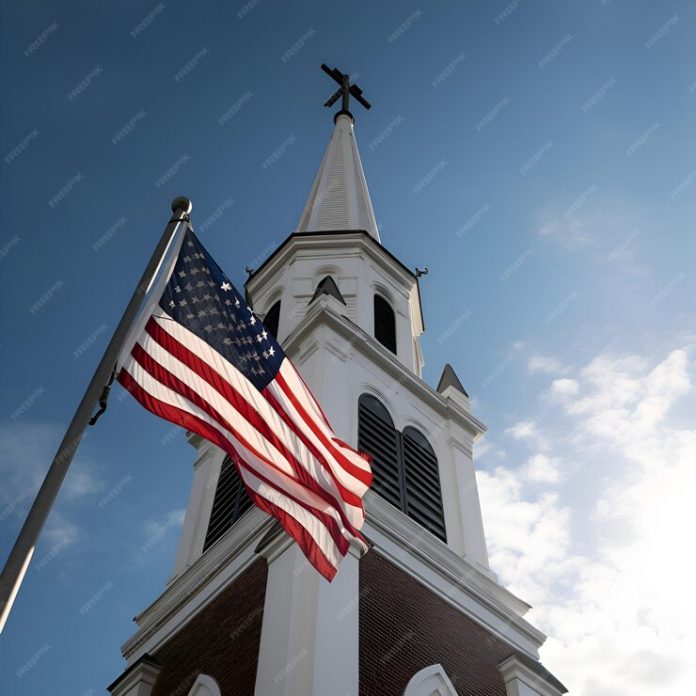This year, a Nativity scene debuted at the U.S. Capitol, accompanied by prayer, carols, and the reading of the biblical Christmas story, thanks to the efforts of a courageous Christian group. While liberals claim that the United States was not founded on Christianity, the historical record overwhelmingly affirms that America was established as a Christian nation, guided by biblical principles that shaped its laws, governance, and culture.
The founding principles expressed in the Declaration of Independence are deeply rooted in Christian teachings and Scripture. John Quincy Adams, a Founding Father and former U.S. president, emphasized the influence of Christian principles on the nation’s foundation, declaring in his Fourth of July address that the freedom enshrined in the Declaration was born from Scripture and moral accountability to God. Adams warned against ideologies like Marxism and Darwinism, which he believed threaten America’s moral and spiritual foundation, stressing that the same biblical truths that guided the Founders remain essential for preserving a free and just society.
The Founding Fathers represented a variety of religious beliefs, from orthodox Christianity to Deism, with most coming from Protestant traditions such as Anglicanism, Presbyterianism, and Congregationalism. Figures like John Jay, Elias Boudinot, and Patrick Henry upheld Evangelical Christian convictions, while others, such as John Adams and George Washington, were influenced by Christian Deism. Deists like Thomas Jefferson and Benjamin Franklin valued reason and moral principles but diverged from traditional Christian doctrines. Despite these differences, all the Founders shared a reliance on divine providence and moral frameworks derived from Christian teachings, which informed the Declaration of Independence and the nation’s enduring vision of liberty and justice.
Supreme Court Justice David Brewer affirmed this Christian foundation in the 1892 Holy Trinity v. United States decision, stating that Christianity “has so largely shaped and molded” the United States that it is “most justly called a Christian nation.” Centuries of legal precedent have emphasized Christianity’s moral and cultural role in both public and private life. Legal figures like Justice Joseph Story argued that Christianity provided the ethical foundation for free government and societal stability, while Founders like George Washington and Abraham Lincoln openly acknowledged the sovereignty and moral authority of God in their proclamations of prayer, thanksgiving, and divine providence.
While the First Amendment prevents the establishment of a national religion, it does not prohibit the public influence of Christianity, which has been integral to the nation’s identity. Recent activist judicial rulings rejecting Christianity’s role in public life depart from historical precedent and the Founders’ intentions. Far from conflicting with constitutional freedoms, America’s Christian values have upheld moral law, individual liberty, and selfless service. Rooted in principles of grace, redemption, and justice, these values remain essential to sustaining America’s identity and freedom.
The Supreme Court, in the 1892 case Holy Trinity v. United States, affirmed that the historical and legal record overwhelmingly demonstrates that the United States was founded as a Christian nation. This decision reflects a recognition of Christianity’s foundational role in shaping American law and society. However, in the late 20th and early 21st centuries, many judicial decisions have sought to minimize Christianity’s influence, favoring subjective interpretations of the Constitution by activist judges. Despite this, abundant historical evidence, including Holy Trinity v. United States, continues to support the understanding that America’s origins are deeply rooted in Christian principles.
Judicial rulings and writings from prominent justices affirm that the United States was founded as a Christian nation, deeply rooted in biblical principles. Justice Joseph Story, in his Commentaries on the Constitution, emphasized that Christianity underpins the moral and legal framework of the United States. He observed that every American colony, from its founding to the Revolution, incorporated Christian principles into its laws and institutions. Story argued that fostering and encouraging Christianity was essential for public policy and societal stability, declaring that governments have a duty to support Christianity as critical to a free and just society. He pointed to state laws, like those in Massachusetts, that explicitly acknowledged the necessity of religion and worship.
Justice John McLean likewise asserted that Christian morality is foundational to maintaining a free government. He believed that the dissemination of Christian principles ensured societal stability and that a nation without moral guidance rooted in Christianity would falter under corruption and selfishness. McLean linked the moral life of a nation to its degree of freedom, insisting that Christian values are necessary to sustain the mission of liberty.
Chief Justice Earl Warren further affirmed Christianity’s central role in shaping America’s history and governance. In a 1954 address, Warren highlighted foundational documents, such as the Charter of Virginia, the Charter of Massachusetts Bay, and the Fundamental Orders of Connecticut, as evidence of America’s Christian heritage. He stated that the Bill of Rights was inspired by biblical teachings, emphasizing freedoms like belief, assembly, and expression. Warren maintained that adherence to Christian principles is vital for national strength and moral integrity.
In the landmark 1892 Supreme Court case Holy Trinity v. United States, Justice David Brewer delivered a unanimous opinion declaring that America is a Christian nation. The case, which involved an Anglican church accused of violating the Alien Contract Labor Law, led Brewer to cite over eighty historical examples demonstrating Christianity’s influence on American laws and customs. These included the invocation of God in oaths, legislative prayers, Sabbath observance, and widespread Christian charitable efforts. Brewer concluded that such traditions and customs unequivocally affirm Christianity’s foundational role in American governance and culture.
Together, these rulings and writings highlight the enduring influence of Christianity on American law and society. While the First Amendment prevents the establishment of a national religion, it does not prohibit the public influence of Christianity. These justices recognized that Christian principles uphold moral law, individual liberty, and societal stability, making them essential to preserving America’s identity as a free and just nation.
The post At Christmas, Remember Our Country’s Christian Foundation appeared first on The Gateway Pundit.
This article may have been paraphrased or summarized for brevity. The original article may be accessed here: Read Source Article.





![President Trump Gives Barron A Shout Out At Inaugural Parade: His Unexpected Response is Pure Gold! [VIDEO] president-trump-gives-barron-a-shout-out-at-inaugural-parade:-his-unexpected-response-is-pure-gold!-[video]](https://news.lateawakening.com/wp-content/uploads/2025/01/35545-president-trump-gives-barron-a-shout-out-at-inaugural-parade-his-unexpected-response-is-pure-gold-video-100x70.jpg)



